While Syriza slowly recovers from the shock of the last few weeks, prime minister Alexis Tsipras is searching for a role. Greece after the referendum, closure of banks and the Brussels diktat. An investigation.
You want support that kind of journalism? In this special case: Translation of such a longread is hard work and cannot be done for free. So please help to crowdfund this report: Bankaccount: Robert Misik. IBAN AT 301200050386142129 / BIC= BKAUATWW —- Keyword: „Translation“
The German Version of this Report you can find here. My Report about Greece from June „My Greece. The Journey inside Syriza“ you can find here.
It’s already past eight in the evening and my feet feel like they’re slowly being cooked in my heavy, leather boots. Admittedly not the best choice of shoes for 36 degrees. I slowly drag myself up the Tsakalof street, which leads up from the chic Kolonaiki district, the seat of government, via the hills of Athens and leads first up and then down into the hip district of Exarchia, with its run down anarchist bars. And, as I drag myself up the hill, lost in thought, I suddenly spot a book in a shop window, just above pavement level: George Orwell’s “Homage to Catalonia”. A homage, but also a farewell to a revolution that failed itself. For days I’ve been thinking about another passage from another great political report by George Orwell, “Left governments almost invariably disappointment their supporters.” This was a sombre observation for Orwell and he wasn’t accusing anybody of anything, especially not the governments. If anything, he was addressing the unrealistic expectations and uncompromising ideas of the supporters who believe that you can walk the straight path, that you can make progress in the real world, without having to compromise and without accepting half measures or evasive manoeuvres from their prime minister and their comrades within the ministries.
Left governments almost invariably disappointment their supporters. Now the Syriza government has also disappointed, even shocked its supporters.
In a way, a party and also a country is bidding farewell to hope. But just five months ago Greece was being swept away by a unique feeling of opportunity. The feeling that everything could be different, that young, modern people were coming into government, that the windows were open and fresh air was going to come in. This was because the Syriza party and Alexis Tsipras didn’t just kindle hope in the hearts of leftists and party supporters, they gave hope to young liberal people too. People were already talking about the “Greek Spring”. The prime minister had, and still has, approval ratings of up to 70%. So it felt a little like, even though the country might be at the edge of the abyss, there could also be a future.
It was two blows which ended this new confidence. First the brutal reaction of the European partners to the announcement of the referendum at the end of June. The European Central Bank froze its funding for the Greek banks. The banks had to close, capital controls were imposed and every Greek person was limited to withdrawing 60 euros per day from cash machines. All payments from and to foreign countries were also stopped. The whole Greek economy abruptly halted, as if it had been frozen from one second to the next. Like a period of numb shock.
And the second blow was the brutal diktat of Brussels, the third bailout program, with conditions that Alexis Tsipras had to accept in full after a night of struggle.
Since then there has been uproar in his party. If there was something like a revolution in Greece it is now an unsettled revolution. An unsettled revolution for an unsettled country. There are dissidents in his party who he now has to fight, a left wing who is refusing to follow the prime minister. The party is divided and it’s the same division which is also splitting the country. Everybody understands why the prime minister had to agree, including the people who are criticizing him for it. Everybody also understands why his critics would say “no” to the program, including those who would, after some consideration, say yes. Everybody understands that there wouldn’t be any point in the prime minister heroically resigning, including the people who are themselves resigning. Maybe it’s simply a characteristic of uncertainty that you not only allow yourself to think that the opponent is rational but also secretly wonder if they didn’t make the right decision after all.
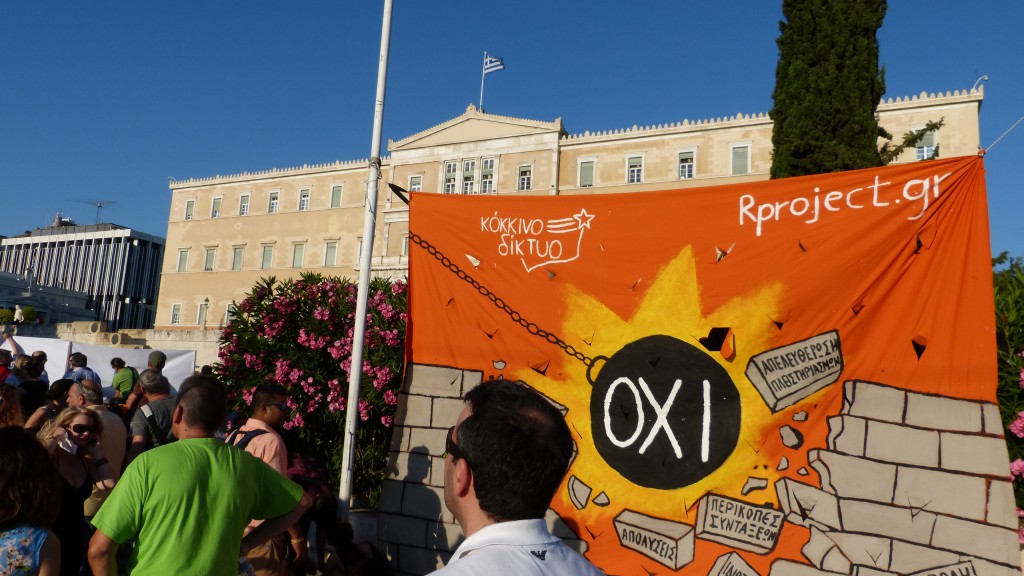 Wednesday evening, Syntagma Square. Angry business people are demonstrating in front of parliament against the rise in sales tax to 23 percent. Right next to them, left radicals are scattered around, waving OXI signs at Alexis Tsipras. Riot police are hanging around in the evening heat and helicopters are circling over the area. It’s strange and funny to see small business owners, tradespeople and bar owners demonstrating alongside zealous radical leftists. It’s as if people from the chamber of commerce in Vienna would riot together with the kids from Kirchwegerhaus (a famous anarchist Austrian squat). Inside the parliament, the session which is supposed to decide on the second wave of austerity measures, including reforms to commercial law, new bank laws, pension reductions and tax increases, has just begun. All of them will weigh heavily on the normal citizen. If you can’t pay the mortgage on your apartment, you will be evicted quicker and people who have more than 100,000 euros in the bank could soon loose parts of their savings if it is necessary to bail-in the banks. The staunchest Tsipras supporters have been fighting all day to get a majority of the Syriza party to vote yes.
Wednesday evening, Syntagma Square. Angry business people are demonstrating in front of parliament against the rise in sales tax to 23 percent. Right next to them, left radicals are scattered around, waving OXI signs at Alexis Tsipras. Riot police are hanging around in the evening heat and helicopters are circling over the area. It’s strange and funny to see small business owners, tradespeople and bar owners demonstrating alongside zealous radical leftists. It’s as if people from the chamber of commerce in Vienna would riot together with the kids from Kirchwegerhaus (a famous anarchist Austrian squat). Inside the parliament, the session which is supposed to decide on the second wave of austerity measures, including reforms to commercial law, new bank laws, pension reductions and tax increases, has just begun. All of them will weigh heavily on the normal citizen. If you can’t pay the mortgage on your apartment, you will be evicted quicker and people who have more than 100,000 euros in the bank could soon loose parts of their savings if it is necessary to bail-in the banks. The staunchest Tsipras supporters have been fighting all day to get a majority of the Syriza party to vote yes.
„It is like this programme was specially designed to sabotage any chance of recovery“ ___ Yanis Varoufakis
Without the votes of opposition parties like PASOK, Nea Demokratia or To Potami, Tsipras wouldn’t be able to get the laws through parliament, but at least 120 members of his party would have to agree, or at least that was the party leadership’s plan. The party is still somehow holding together, but it is the small details which show how the tension is rising. The people around Tsipras can be heard saying that a split in the party is probably unavoidable if, “two different strategies are followed in the long term.” Tsipras himself has been quoted from leaks in several newspapers as asking anyone that wants Grexit or wants to pay pensioners with a virtual, parallel currency or substitute money, to “please step forward and tell the people all about it,” (by which he means: good luck!) But the left has been grumbling more and more that, “if we say austerity programme and submission are the only choice we have, then we are turning our backs on the people who have fought for us,” and the left isn’t afraid any more of complaining, specifically and often, about the prime minister.
“So, you’ve left the daily grind behind?” I ask Yanis Varoufakis, half jokingly. “No, I still have four appointments an hour, but at least I can sleep at night,” he replies, laughing. Varoufakis is still a member of parliament and in demand throughout Europe. Somehow we manage to squeeze a short conversation into his diary. He resigned as finance minister immediately after the referendum and is now firmly saying “no” to the bailout programme.
 “An economic crisis leads to instability in the political system, and usually not in a direction we could call progressive,” Varoufakis says. “In these five years, however, Syriza has managed to turn this danger into a creative, progressive force. But now that Syriza has been humiliated by being forced to accept an agreement that can’t possibly work, we are now confronted with the impossible task of continuing to be a progressive and creative force and, at the same time, implement these measures that will stall the economy.”
“An economic crisis leads to instability in the political system, and usually not in a direction we could call progressive,” Varoufakis says. “In these five years, however, Syriza has managed to turn this danger into a creative, progressive force. But now that Syriza has been humiliated by being forced to accept an agreement that can’t possibly work, we are now confronted with the impossible task of continuing to be a progressive and creative force and, at the same time, implement these measures that will stall the economy.”
So, what next? Can it be done or is it completely impossible?
“I hope I’m wrong. But I don’t think that anything progressive can come from the situation we have right now with this programme. It is like this programme was specially designed to sabotage any chance of recovery.”
It seems every step taken in Greece today is like a step taken on the tightrope. A prime minister who must implement a memorandum that he doesn’t believe in, with a parliamentary opposition who have for the first time joined an alliance with the prime minister that crosses party lines – which alone is a sensation in Greek political tradition, which is not exactly known for its collaborative politics – an alliance that includes rivals within his own party, but who don’t want to undermine his success. This is all somehow understandable, but also somehow crazy.
“So what are you now exactly?” I ask Varoufakis. “The opposition, a dissenting ally of Tsipras, or what?”
“I want to have a unifying role. We have to stay together, even if it’s tough, even if we disagree. We have been pushed into a corner and that is a shame for Europe, not a shame for us. Europe has some hard questions to answer, questions about the story of Europe that will have to be answered in the future. We have to stay together, to keep hope alive. And we have to realise that there are no good decisions in this situation. At moments like this, every decision is both right and wrong at the same time. The prime minister is right in wanting to stay in power and keep fighting, but, on the other hand, I was just as right in deciding to resign. I’m not more of a ‘revolutionary’ or ‘further to the left’ than Tsipras, and I don’t believe that Tsipras is more ‘responsible’ than me. Each side should respect that.”
And what role does he want to play in the future? Perhaps even the role of spokesman, a spokesman who can speak more freely now, to travel through Europe forging the alliances and bringing the change that has obviously been forgotten over the past five months?
“I would love to play that role. I am ready to leave no stone unturned in the search for alliances. We need a pan-European alliance for the democratisation of Europe and the end of a macroeconomic policy that is holding us all back, is damaging, is an obstacle and is throwing away economic opportunities in North and South Europe.”
Varoufakis is still a star in Greece. Not just because of his undoubted aura of “radical chic”, but also because he is a brilliant communicator who can distil the short-term and long-term goals of progressive politics into convincing arguments. This ability is, of course, a product of intellectual sharpness and clarity combined with a lot of self-confidence, but with a flip side that undoubtedly includes the inability to be flexible, the inability to be a little opportunistic in snuggling up close to reality if you notice that not everything is going your way. Tsipras must be happy to be rid of him and to have a more pragmatic character, such as Euclid Tsakalotos, in the vital role now, but he must at the same time miss Varoufakis as an intellectual communicator.
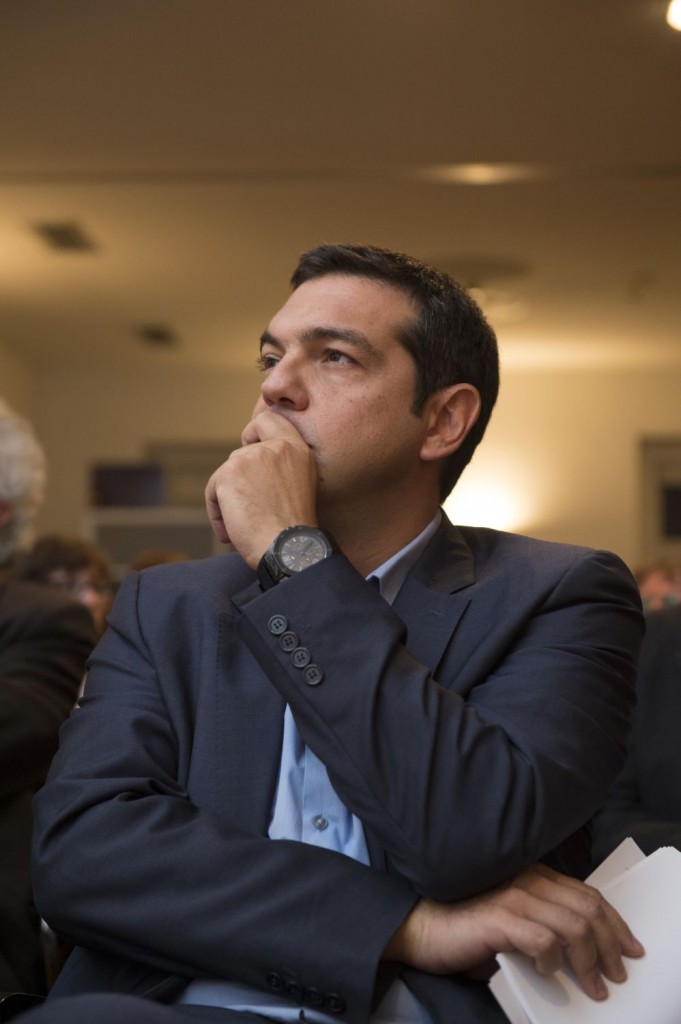 “Tsipras has really grown to become a statesman over the last two weeks,” Christos Katsoulis says. We are sitting in a side street of Exarchia Square and we are wolfing down anchovies. Katsoulis is sympathetic and critic to Syriza but for sure not unduly partisan and keeps an eye on events because of his job. He is the manager of the Athens office of the Friedrich Ebert Foundation, a German political foundation associated with the Social Democratic Party of Germany. Tsipras dominates the stage, and people don’t even hold his flip-flops against him. But Tsipras has been holding a consistent line since that night of the Brussels diktat when, in the grey morning night, he finally accepted the austerity programme. He often talks with the people and he doesn’t tell them any political bullshit. He says that he only signed the programme because the alternative would have been a disaster. But he doesn’t say that he completely rejects it. “He makes a clear division between what is just savings and cuts and will further choke the economy and what could be called necessary modernisation and reforms,” according to Katsoulis. Tsipras has appropriated this part of the present and future decisions. Even including elements of pension reform, and he says things that aren’t welcome to old socialist ears, such as, “I do not think that it is progressive political policy to send someone into retirement at 45 or 50.” Raising the retirement age, which will make savings to the pension budget, is not automatically an attack on progressive goals – as long as there are good jobs for people.
“Tsipras has really grown to become a statesman over the last two weeks,” Christos Katsoulis says. We are sitting in a side street of Exarchia Square and we are wolfing down anchovies. Katsoulis is sympathetic and critic to Syriza but for sure not unduly partisan and keeps an eye on events because of his job. He is the manager of the Athens office of the Friedrich Ebert Foundation, a German political foundation associated with the Social Democratic Party of Germany. Tsipras dominates the stage, and people don’t even hold his flip-flops against him. But Tsipras has been holding a consistent line since that night of the Brussels diktat when, in the grey morning night, he finally accepted the austerity programme. He often talks with the people and he doesn’t tell them any political bullshit. He says that he only signed the programme because the alternative would have been a disaster. But he doesn’t say that he completely rejects it. “He makes a clear division between what is just savings and cuts and will further choke the economy and what could be called necessary modernisation and reforms,” according to Katsoulis. Tsipras has appropriated this part of the present and future decisions. Even including elements of pension reform, and he says things that aren’t welcome to old socialist ears, such as, “I do not think that it is progressive political policy to send someone into retirement at 45 or 50.” Raising the retirement age, which will make savings to the pension budget, is not automatically an attack on progressive goals – as long as there are good jobs for people.
Despite, or because of, his agreeing, which everyone thinks is right, to a programme, which everyone thinks is wrong, Tsipras has an approval rating of 70%.
But which path exactly is Tsipras walking these days? Is he someone who sees himself basically as a resistance fighter against the dominant neoliberal ideas, and has just been forced to surrender? Will he now become a progressive pragmatic, like Bruno Kreisky, a politician of the left who accepts what is possible in reality, not to be subject to it, but to gradually shift what is possible through a long-term reform process? Or is he destined to share the fate of Blair, the role of a moderniser who ended up being a doormat for the ruling elites?
We don’t yet know for sure and this also makes him difficult to predict. There is something sphinx-like about Tsipras. Is he a chameleon genius clinging to power? Or is he actually somebody who shies away from decisions, who doesn’t no know who he should be as prime minister. Should he lead the opposition to “the system” or practice Realpolitik?
“A popular and pragmatic Tsipras emerges,” said New York Times earlier this month. It paints a picture of quite a unique politician of the left, who can simultaneously speak the language of both reform and social justice. So unique that he now has no challenger in Greek politics. But he has come a long way to arrive at this point, “he still doesn’t wear a tie, but he has moved a long way towards the mainstream,” according to the influential American newspaper. People who have worked with him for a long time often deny that he is on the way towards mainstream, but in the end they aren’t really sure.
“Deploying unrivalled communication skills, the telegenic Tsipras has allowed Syriza to speak for a whole sector of society that for decades was hounded and harassed by authoritarian rightwing rule”, the Guardian once wrote about the prime minister.
You have to understand the unique position that Tsipras finds himself in. He risked a referendum, was punished with a complete halt to the economy, and had to accept a humiliating defeat in Brussels that would have probably meant the end for anyone else. But not Tsipras, who the Greeks still think kindly of for, “fighting like a lion.” Superficially this might seem an absurd arrangement: 60% of Greeks voted for oxi, and therefore against another austerity programme. However, 70% are also of the opinion that Tsipras was right to agree to a package that was, in some points, worse than the one they declined, which, in turn, 70% of Greeks today think is wrong. Despite, or because of, his agreeing, which everyone thinks is right, to a programme, which everyone thinks is wrong, he has an approval rating of 70%. It is like an optical illusion that, depending on the angle you look at it, has numbers that seem totally crazy and then in the next moment insightful and plausible again. The same goes for the perception that Tsipras has gone through a series of flip-flops over the previous weeks. Naturally, he could have bowed to the diktat from Brussels a month before, and could have spared himself the referendum and his long night, not to speak of the economic thumbscrews. But it is just this, if you will, symbolic setting where he didn’t prematurely capitulate, but fought to the bitter end, that was necessary for him to be able to about-turn without losing any of his political credibility, just as it was only his temporary failure that led to a pyrrhic victory for the European powers advocating for austerity. Brutal blackmail with the most extreme threats and Schäuble imposing his authority has led to a sudden split within Europe that the pro-austerity faction won’t be able to easily heal, the relative isolation of Greece has turned into a relative isolation of mighty Germany. In this way Tsipras has turned an economic defeat into a temporary political victory, a slight shifting of the front in the trench warfare for domination of Europe.
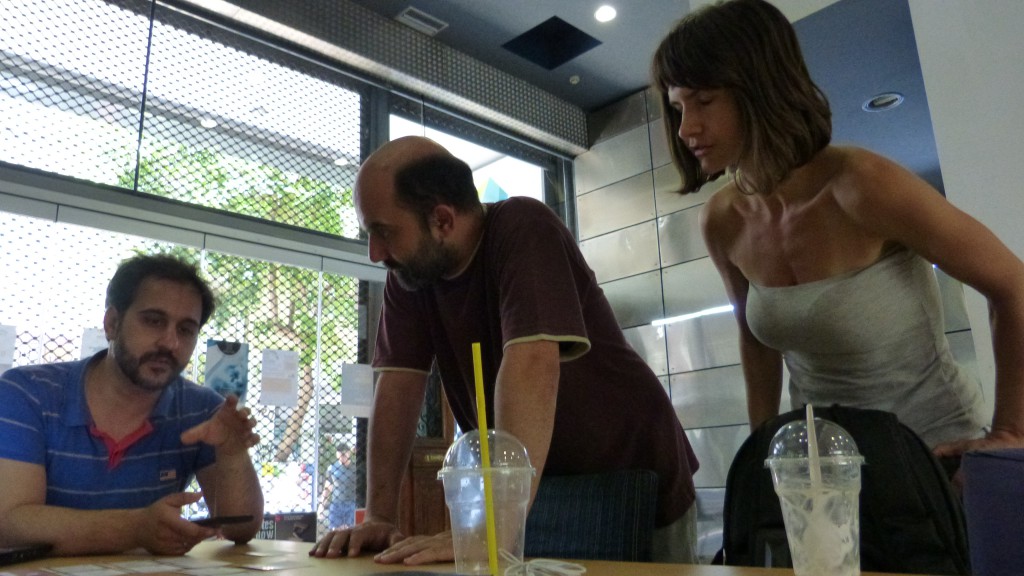 The price was, of course, high. This last week has been a time when the country has hesitantly started to recover from the shock of the previous weeks. I stroll Exarcheia through the busy streets, under arcades, palm trees and branches, while oleander blossoms blow in my face. In Klisovis Street, I meet Maria Calafatis and Stavros Messinis, two of the stars of the thriving startup scene. Maria is sitting outside the Cube drinking a Cafe Freddo. The Cube is a coworking space with six floors where there are two dozen startups. Most are tech companies and there are several who operate in the tourist sector.
The price was, of course, high. This last week has been a time when the country has hesitantly started to recover from the shock of the previous weeks. I stroll Exarcheia through the busy streets, under arcades, palm trees and branches, while oleander blossoms blow in my face. In Klisovis Street, I meet Maria Calafatis and Stavros Messinis, two of the stars of the thriving startup scene. Maria is sitting outside the Cube drinking a Cafe Freddo. The Cube is a coworking space with six floors where there are two dozen startups. Most are tech companies and there are several who operate in the tourist sector.
“You can’t pay your bills, and you can’t pay your employees,” Maria Calafatis says. “You can survive for two or three weeks that way, but how are things supposed to go on after that?” Now, at least the banks are open again. But the capital controls are still in force and that isn’t going to change any time soon. If you want to send money abroad you have to go through a long procedure. Companies have to submit an application for a bank transaction approval appointment, even if they just want to pay the smallest of bills. Anyone who needs to import goods, whether produce for supermarkets or raw materials for factories, has to add their names to a long waiting list and spend a couple of weeks hoping that they will eventually get to the top. Because the banks still don’t have any liquidity, large transfers have almost no chance. “We can’t even order servers,” says Dimitri, who works for a British tech firm and is working on an order from British Telecom.
The Greek economy has been almost in deep freeze for going on three weeks. This isn’t just because people can hardly get their hands on cash – even people with a mattress full of bank notes are not spending. In the weeks of capital controls cash has become a rare commodity, even for people who are not poor, and people are hoarding it. And, on top of all this, the plan decided at the EU summit calls for an increase in sales tax. Most goods, coffee in the café, food in the restaurant, most daily necessities – it all has to be increased by the new rate of 23%. And this is all in addition to new austerity measures.
The economy, in shock because of capital controls and decreasing demand combined with higher taxes – not exactly a plan that guarantees the success that the strategists of the EU group wanted. It almost seems like a bad joke that the shops are now allowed to be open on Sunday – a diabolical fantasy that the economy can recover if the Greeks can spend the money they don’t have on Sunday as well.
“The worst effect was the effect it had on the consumer,” says small businessman Giorgios Goniadis. “The orders through my online store, for example, have dropped by 60 to 70 percent.” And the sales tax, the cost of health insurance and income tax are increasing at the same time. “From twenty euros income, ten goes to the government,” Goniadis says, who has only just started to get his business off the ground. He cannot understand why the troika of IMF, ECB and EU Commission is forcing through an austerity programme that is choking businesses.
In spite of all this, we cannot exactly say that Maria Calafatis and her partner Stavros Messinis are the sort of people who are easily put off. Seven years ago, they opened their first coworking space, which was soon bursting at the seams, so it now takes up the whole office building in Kislovis Street. But the company has long outgrown the days of throwing together technology solutions. That’s why the top floor is home to economist Aristos Doxiadis‘ venture capital firm Openfund, which brings international investor capital to the recent startup scene. The network includes lawyers and notaries, who smooth the way for new overseas companies through the forest of bureaucracy.
“The crisis isn’t only a bad thing,” says Maria Calafatis with the enthusiasm, which is typical to the startup- and tech-community. “It helps people to go beyond their comfort zone.” Previously, she explains, the most important thing in life for the Greeks was to get a secure job with the government. Risky business strategies were seen as something for people who were a little crazy. This is starting to change. Now parents bring their children to the workshops at Cube, because, obviously, IT jobs are better for the future than the sort of jobs people used to do. It is clear that Maria has told this story many times before. She tells me about it, not exactly bored by the repetition, but with the sort of intensity of people that have a mission and can talk for a long time without taking a breath, people who need to convince investors, who have to get their foot in the door with bureaucrats, and who are slowly trying, bit by bit, to seed an idea with people who started off thinking it was nonsense. The idea that Greece can manage its economic problems using new, unconventional concepts.
On the ground floor, a couple of Spanish IT people are putting together cash machines for bitcoins. The virtual currency has been a great help because it is not effected by capital controls but can be transferred in euros – and that means money can be sent this way, which otherwise wouldn’t be possible. Both the virtual and non-virtual are combined in the most beautiful way at Cube, as is common across the startup scene.
A lot of young people have reacted by leaving the city and moving to the fields of their mothers, fathers, grandmothers and grandfathers, where they produce upmarket goods which are then, in turn, distributed through new service channels. Some people are making a lot of money, even as far away as Dubai.
A drop in the ocean, far too small and virtual to be able to pull the Greek economy out of depression? This is what most people think, but it might not be true, just like the current notion that nothing in Greece was ever competitive. “The Greeks are now making more money by developing apps than from selling olive oil,” Christos Katsoulis says. Two years ago a study was published that listed ten glimmers of hope for the Greek economy, which included high-tech industry, renewable energy, sustainable agriculture and, of course, tourism. But these days it seems this optimism has all dissipated. “The government needs a plan, the eurozone ministers need a plan – but there isn’t any plan,” says Stavros Massinis, Maria’s partner. “The hope of the last three months has just faded into thin air.” And he adds that this is more than just the symptom of an economic crisis, it is a national crisis, an emotional, mental crisis that makes it even harder to solve the economic crisis.
The eurozone taskmasters will eventually have to confront the question of whether stamping on the first green shoots of hope just to show a recalcitrant government who’s boss was a short-sighted policy. They will have to ask themselves if they will pay the same price as Brezhnev paid for putting an end to the Prague Spring, in other words a passive population combined with long-term economic and mental depression. It was this hope that was the unique thing about Syriza’s election victory. Suddenly everyone, including the people who didn’t vote for the party, were caught up in a wave of optimism. Everyone thought Tsipras and his people, though they may have been from the left, were, more importantly, young, modern people who were the only ones who had a chance of clearing away the old corrupt system. Or, to put it another way, the left could be the agents of modernisation. This was the mood which was already being called the “Greek Spring”, but this spring has now been cut off. Hope hasn’t entirely disappeared but the shocking days of the last few weeks have dealt it a savage blow. And it isn’t really clear what plans the Syriza government has for modernising the country – because everyone’s attention has been so focused on hopes for an end to austerity policies. They weren’t able to design a society that both performed better and was fairer. It’s high time, despite obstruction from eurozone “partners”, to put fourth a few ambitious plans. “What were they even doing the whole time in opposition? Didn’t they do any preparation?” Stavros complains.
„We never thought that at the end of the negotiations with our EU partners, they would tell us, ‘either you completely surrender or we will destroy your country’.“ ____ Haris Golemis
Athens is a city with many faces. Here there are hot suburbs with thundering traffic on their wide roads, elsewhere scruffy, cosmopolitan hipster neighbourhoods like Exarchia, and elsewhere again there are the imposing neighbourhoods of the moneyed classes in the centre of the city, and just a few metres away are small areas dominated by single-storey buildings where artists, bon vivants, and Chinese merchants live alongside Greek store owners and normal, everyday people, areas such as around the Agion metro station, which are like Brooklyn in being a village within a city. In Sarri Street, huge graffiti paintings create a street art gallery for Athens, and this is also the location of the headquarters of the Nicos Poulantzas Institute. The Poulantzas Institute is a Syriza non-profit foundation with the goals of fostering the values of the left, a sort of forum for party intellectuals.
I’m here to meet Einstein.
Of course, Einstein isn’t really called Einstein, he just looks like Einstein with his long, curly, white hair and moustache. In real life he is called Haris Golemis and he is the director of the institute, one of the leading thinkers of Syriza and also a member of the central committee. Haris is in low spirits because he is absolutely sure that a new phase has started in the story of Syriza, and nobody knows what turns that story will take. The only thing people know for sure is that the party will have to do things differently to the previous five months. “Maybe we became a victim of miscalculation,” he says. “We overestimated our chances of implementing an anti-austerity programme within an eurozone ruled by neoliberalism. And we definitely underestimated the existing balance of power and the hegemonic role of Germany. Perhaps our rhetoric also got in our way, the very same rhetoric that brought us to power. But most importantly,” he continues, “we never thought, to be blunt, that at the end of the negotiations with our EU partners, they would tell us, ‘either you completely surrender or we will destroy your country’. We hadn’t predicted that, that such a thing could happen in Europe. And that’s what we weren’t prepared for.”
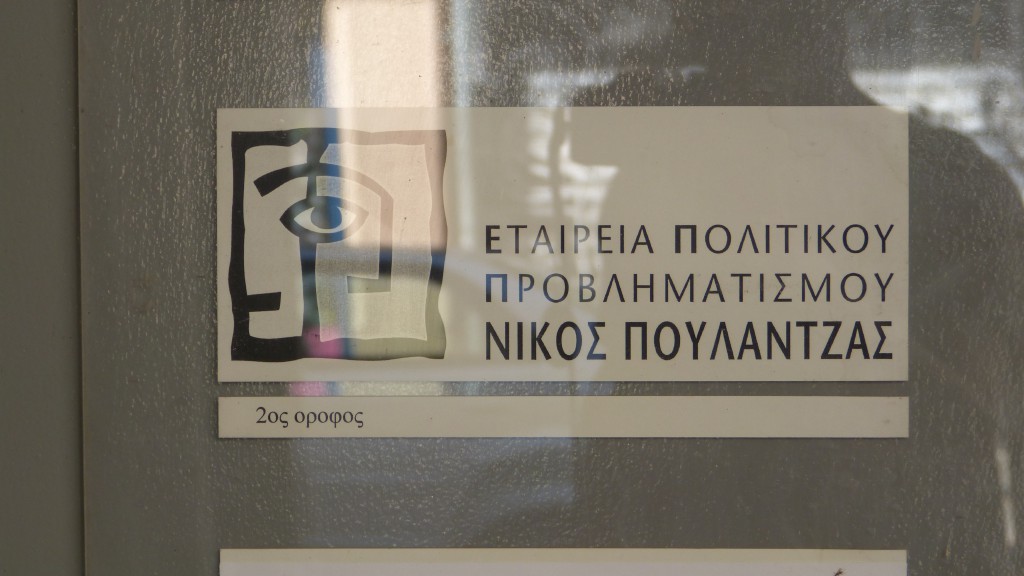 People like Golemis and most of the decision makers in Syriza that I have met over recent months are remarkable in their lack of the rigid zealotry that is often encountered on the left, almost all of them have a thoughtfulness, that sometimes even looks like a lack of self-confidence. It is this thoughtfulness that seems to prevent the conflicts and differences of opinion within the party from escalating in this difficult situation. “Obviously, the party isn’t in good shape,” Haris says. He won’t yet speak of splits, “of course, there are people who think a government that gives in and signs such an agreement with the infamous troika does not deserve any support anymore, and there are others that think that deputies that vote against the prime minister in circumstances like this, instead of supporting him, don’t have a place in the party.”
People like Golemis and most of the decision makers in Syriza that I have met over recent months are remarkable in their lack of the rigid zealotry that is often encountered on the left, almost all of them have a thoughtfulness, that sometimes even looks like a lack of self-confidence. It is this thoughtfulness that seems to prevent the conflicts and differences of opinion within the party from escalating in this difficult situation. “Obviously, the party isn’t in good shape,” Haris says. He won’t yet speak of splits, “of course, there are people who think a government that gives in and signs such an agreement with the infamous troika does not deserve any support anymore, and there are others that think that deputies that vote against the prime minister in circumstances like this, instead of supporting him, don’t have a place in the party.”
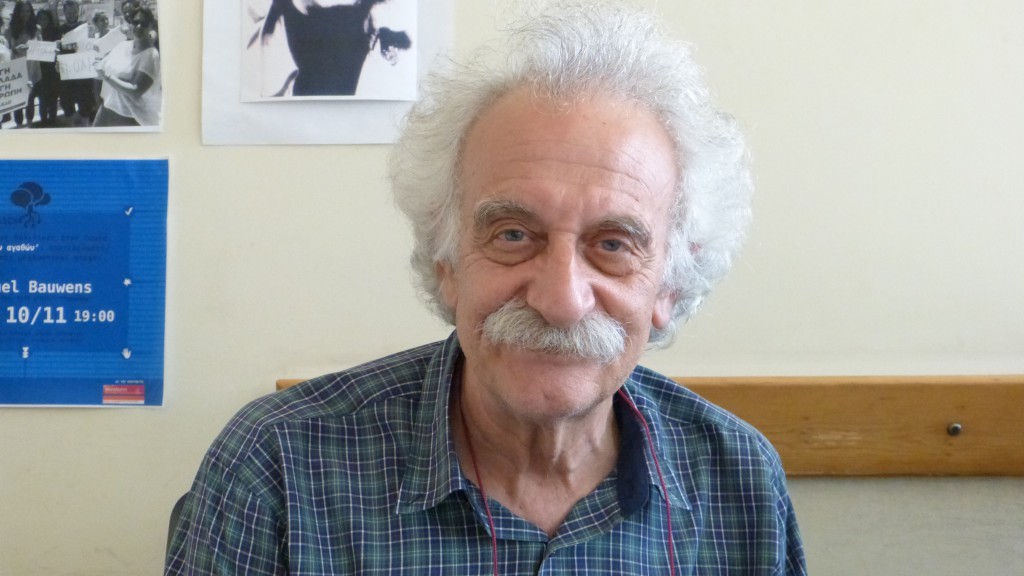 Haris is this contemplative type of politician, and you can almost see him thinking in real time. He puts forth his argument, but then interrupts himself. “We were always a party that likes to discuss the issues and this pluralism is now a part of our identity and our strength. But it isn’t easy to keep it going during a crisis, and especially in government where painful decisions have to be made….”
Haris is this contemplative type of politician, and you can almost see him thinking in real time. He puts forth his argument, but then interrupts himself. “We were always a party that likes to discuss the issues and this pluralism is now a part of our identity and our strength. But it isn’t easy to keep it going during a crisis, and especially in government where painful decisions have to be made….”
I take the metro up to Piraeus, to the harbour, and hop in a taxi for Pirraiki, an old coastal town, it doesn’t take thirty minutes to get from the centre of Athens to the beach. I sit on the rocks and think about this uniquely confused revolution, which isn’t of course really a revolution, but an upwelling of energy that is trying to make Europe into something completely different and is now lost in thought, but certainly not unproductive thought. Of course, this is just another snapshot. A week ago people were still in shock and now they seem perceptibly different, with many people saying different things to what they were saying just the day before. At such moments in history people think “emotionally”, even if the emotion doesn’t last very long. Who hasn’t experienced something similar in their own lives? Exactly, we all know all about it. Syriza and the Greeks are part of the European Union, but they aren’t just a part, but for a long time now they have been all anyone has been talking about, they are a part and they are the centre at the same time, and therefore also the “problem” you have to have an opinion about. But even this isn’t quite correct. Since Syriza has been in government, they haven’t been just the central problem, they have been something like a litmus test, literally the deciding factor, and the conflict itself. For example, the conflict between austerity and Keynesianism played out with careful depoliticised regularity as long as it was only the familiar intellectual controversy, but when it was about Greece it suddenly became a fight in deadly earnest. Or, to put it more simply, we had almost forgotten what an ideological war was in our cosseted and depoliticised comfort zone until the $64,000 question was asked, “What do you think of Syriza?” Now we are relearning what basic differences of opinion can entail. This isn’t a bad thing, but it burdens Tsipras and his people with a weight they can hardly be expected to carry. Naturally, they gain importance but, at the end of the day, they are just the government of a small, crisis-wracked nation, whose people are perhaps not keen on being made an example of as the bystanders in a global conflict between left and right, but might instead be set on having a tolerably good life and, yes, even having something of a future once more.
The conflict in Greece is also an example of how Europe is implementing an authoritarian regime, how pressure and threat is more and more being used to create a climate of fear, with ultimatums, “take it or leave it,” intimidation and fear of catastrophe, serving the explicit goal of empowering Eurogroup puppetmasters, who discipline unwanted governments and also discipline recalcitrant citizens, and make them pay when they have had the temerity to vote the wrong way. This is now on show in Greece in its coarsest form, but the next time European prime ministers comes back from an emergency all-night session and tell their parliaments that they have to immediately agree or the sky will fall in, this will just be a less obvious example of this style of government, which will destroy democracy. Instead there is a democracy with almost no parliamentarians, and a democracy that has long been doing just fine without citizens. This dark utopia of authoritarian rule from top down, this dystopia, which is now connected to the name Wolfgang Schäuble, is much more than just political spleen, as is obvious from the drama of recent months, displayed in its pure form, out in the open and unashamed, but, of course, it isn’t something that is limited to just the Greeks. Any of us Europeans could be next. Or, to paraphrase Ernst Bloch, it is being an „Entstellung zur Kenntlichkeit“ – “changed to the point of recognition,” – the true character of current government revealed via the capitalism of constant crisis. In this capitalism, the ruling elites feel ever less the necessity (or: are ever less capable) of pacifying citizens with good news so they can rule by consensus. Crisis capitalism is becoming “authoritarian etatism” as seen in the analysis of Nikos Poulantzas, who the Poulantzas Institute is named after, a legendary figure among Greek theorists of the left and a contemporary of Foucault and Althusser.
It is a characteristic of this contemporary form of government that it usually comes softly in the guise of the technocrat, the pragmatist that both swaggers and creeps. It swaggers in that it imagines it is the only form of government, and seeks to brand all other politics as “old fashioned”, and it creeps by presenting itself as simply doing what is possible, with no great vision or any hint of imagination.
It is no wonder that this form of politics collided head on with that of Syriza, that it seeks to discredit Syriza as “populists.” Populism is not a political logic among a selection of other political logics, it is in essence, “the political logic.” Technocratic logic is not an alternative political logic, instead it is an apolitical logic that does not allow ordinary people a place in the political arena any more, instead it is a way of denying a voice to the citizens being governed. This is the basis of the strangely close relationship between pragmatism and authoritarianism. Pragmatism doesn’t need any citizens to take part, because they would just mess things up. “We can see populism as one way of constituting the very unity of the group,” wrote the Argentine political theorist Ernesto Laclau in his book, “On Populist Reason”. The citizenship that is being addressed by populism does not already exist, it is created by populism. It is, in a way, welded together by populism. Populism doesn’t appeal to all citizens, the populus, instead it appeals to the plebs, the underprivileged, who have not previously been heard. But it is more than this, it is a political operation that claims that the plebs „is the only legitimate populus,” (Laclau), and that they are the people to articulate the democratic and social rights of normal people to the elites and oligarchs. Populism is “the voice of those who were excluded from the system.” It creates relative identity among heterogeneous groups, those groups that feel addressed. Populism understood in this way is a resistive (anti-)authority strategy against the hegemony of neoliberal post-politics. According to Laclau, only populism “is political…; the other type involves the death of politics.”
 It is this return of political convictions that the neoliberal elites are afraid of. Nobody has put this in such stark terms as the President of the European Council, Donald Tusk, the man who at the end of the long night in Brussels, along with the French president, Francois Hollande, managed to negotiate a compromise between Angela Merkel and Alexis Tsipras. After he had caught up on his sleep, Tusk summoned a group of hand-picked journalists and said, “I am really afraid of this ideological or political contagion, not financial contagion, of this Greek crisis. For me, the atmosphere is a little similar to the time after 1968 in Europe. I can feel, maybe not a revolutionary mood, but something like widespread impatience. When impatience becomes not an individual but a social experience of feeling, this is the introduction for revolutions.”
It is this return of political convictions that the neoliberal elites are afraid of. Nobody has put this in such stark terms as the President of the European Council, Donald Tusk, the man who at the end of the long night in Brussels, along with the French president, Francois Hollande, managed to negotiate a compromise between Angela Merkel and Alexis Tsipras. After he had caught up on his sleep, Tusk summoned a group of hand-picked journalists and said, “I am really afraid of this ideological or political contagion, not financial contagion, of this Greek crisis. For me, the atmosphere is a little similar to the time after 1968 in Europe. I can feel, maybe not a revolutionary mood, but something like widespread impatience. When impatience becomes not an individual but a social experience of feeling, this is the introduction for revolutions.”
The thing Tusk is afraid of is actually a challenge to anyone who wants to save the European Union from its elites. How is it possible to turn this impatience into pragmatism, without demoralising your own people with the petty details? This is the challenge now confronting Alexis Tsipras, and how he rises to it will determine the future of his government. We are all confronted with the challenge of organising this contagion that Tusk is so frightened of. Because, if recent months have shown anything, it is that Greece is, from a certain point of view, just the pond where this conflict has so far taken place. But the naval battle won’t be won in a pond.
The battle will somehow be won – if it will be won -, but it isn’t clear what this kind of “winning” actually means. I’m still thinking about a quote by George Orwell and, because a real reporter never travels without one of this great reporter’s books, I have the passage to hand. “The greatest difficulty of all is the fact,” Orwell wrote after the first Labour Party victory, “that the Left is now in power and is obliged to take responsibility and make genuine decisions. Left governments almost invariably disappoint their supporters because, even when the prosperity which they have promised is achievable, there is always need of an uncomfortable transition period about which little has been said beforehand.”
Übersetzung: Spiralcat-Translations. Link here
You want support that kind of journalism? In this special case: Translation of such a longread is hard work and cannot be done for free. So please help to crowdfund this report: Bankaccount: Robert Misik. IBAN AT 301200050386142129 / BIC= BKAUATWW —- Keyword: „Translation“
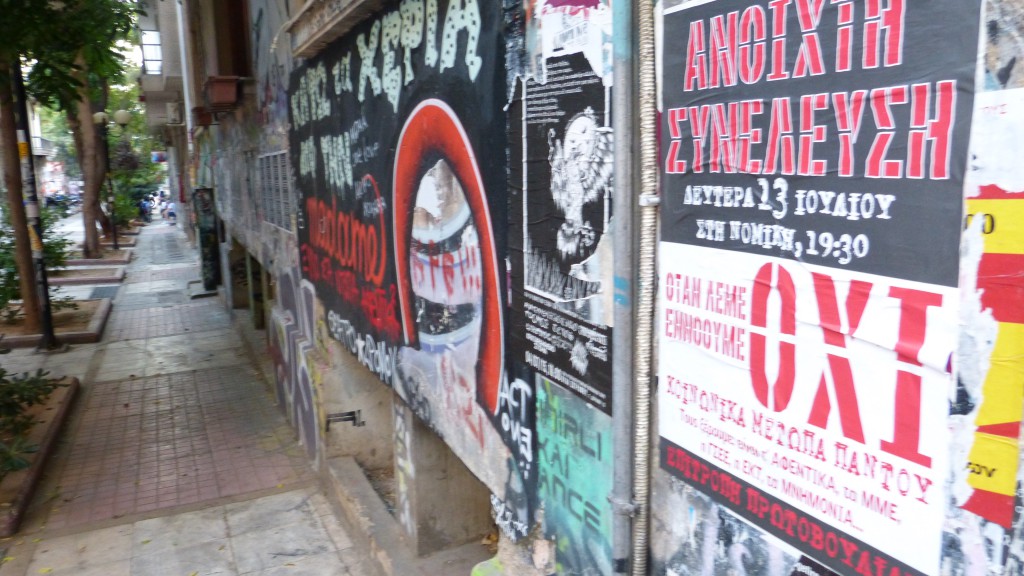
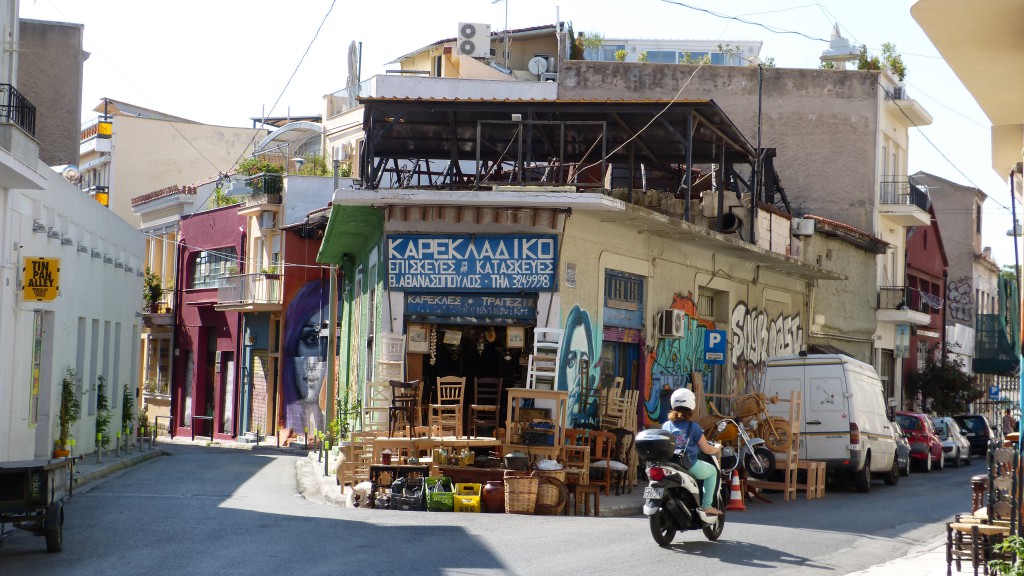
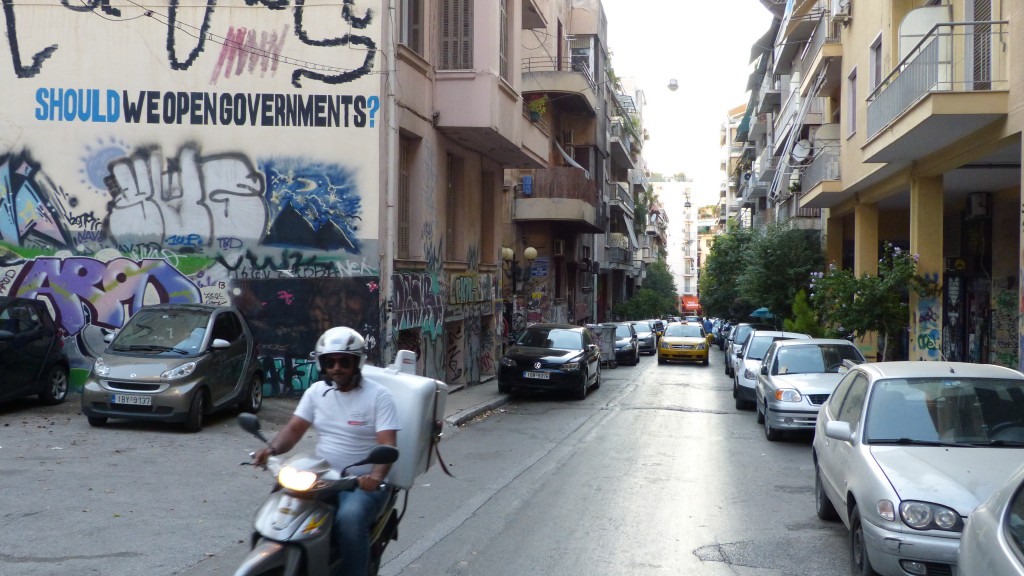
Wirklich grossartiger artikel, aus dem wahrscheinlich hoffentlich ein buch entsteht! Liebe grüsse, wilfried
naja, ein buch entsteht auch zu einem anderen thema, wo aber diese reports schon reinfließen! danke dir wilfried, und wenn du es in deinen kanälen sharen könntest wärs fein!
Vielen Dank für diesen unglaublich inhalts- und facettenreichen Artikel! Schade, dass die Erkenntnisse daraus nur schwer in das richtige und gute Handeln umsetzbar sind oder man etwas zurückgeben kann.
Habe den Eindruck, dass sich nun doch wieder Desillusionierung ausbreitet, obwohl man spürt, welch starken inhaltlichen Diskurs Syriza initiieren konnte und wie sehr es die Menschen berührt.Selbst im Forum der FAZ habe ich phasenweise viel mehr Offenheit als sonst erlebt.
Herzliche Grüße,
Christina Blume
Vielen Dank für diesen unglaublich inhalts- und facettenreichen Artikel! Schade, dass die Erkenntnisse daraus nur schwer in das richtige und gute Handeln umsetzbar sind oder man etwas zurückgeben kann.
Habe den Eindruck, dass sich nun doch wieder Desillusionierung ausbreitet, obwohl man spürt, welch starken inhaltlichen Diskurs Syriza initiieren konnte und wie sehr es die Menschen berührt.Selbst im Forum der FAZ habe ich phasenweise viel mehr Offenheit als sonst erlebt.
Herzliche Grüße,
Christina Blume